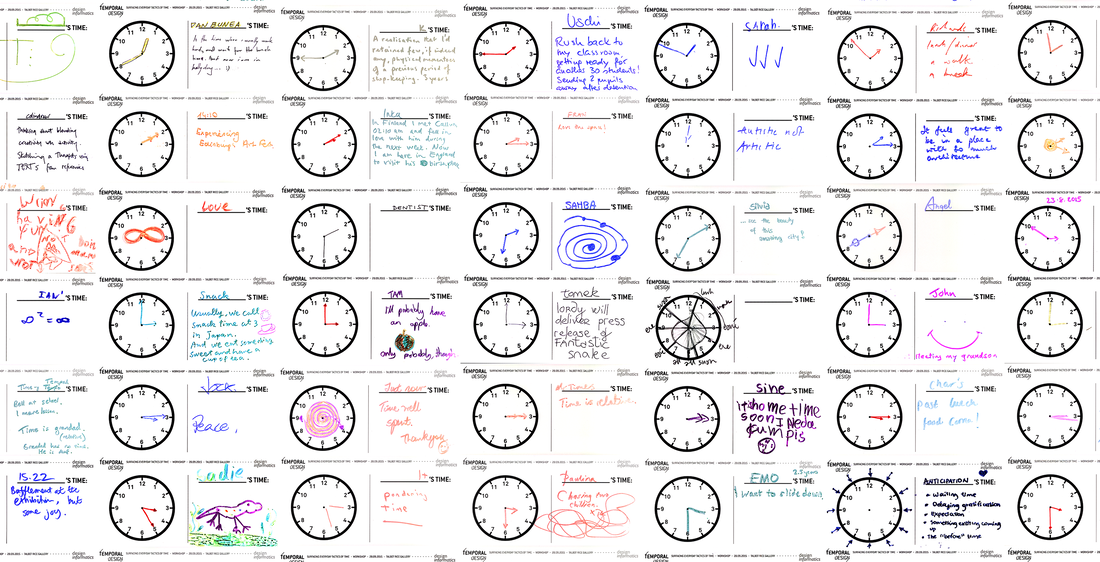11th February 2022 10-13.30 CET
Co-organisers:
Co-organisers:
- The ERC funded CALENDARS project
- The Centre for the Study of the Sciences and the Humanities, University of Bergen
- The Research Council of Norway funded Lifetimes project, University of Oslo
- The Oslo School of Environmental Humanites, University of Oslo
|
We need different times, but do we have the methods to unfold them?
Human life and organization need to be fundamentally transformed to support more inclusive and sustainable worlds. This requires attention to a key foundation of shared life and agency: time and temporality. While rational, instrumental, and typically short-term agency is a taken-for-granted structure in late modern society, this has impeded an understanding of the complexity of ecosystems, of social change and of the inter-relations between individuals, people and their worlds. |
|
Changing temporal habits and orientations requires experimentation, reflection, collaboration, and methods for researching the complexity of time with and across collectives.
Research on time and temporality abounds across a range of disciplines and sites. Alongside this thematic interest, is an interest in how we go about this research, with adaptations of traditional methods such as time use studies, mapping exercises and new approaches such as artistic research.
Research on time and temporality abounds across a range of disciplines and sites. Alongside this thematic interest, is an interest in how we go about this research, with adaptations of traditional methods such as time use studies, mapping exercises and new approaches such as artistic research.
This event brought together over 100 participants interested in working with time in groups and communities, and explore processes and methods to collectively understand the pressures and possibilities of time. We explored approaches to discussing, communicating and questioning time with others and asked the question ‘we need different times, but do we have the methods to unfold them?’
We initially suggested these questions:
Workshop details
Timely Methods for Novel Times! took place on Friday February 11, 2022 at 10.00am - 13.30pm Central European Time. This free online workshop was facilitated by Improbable Theatre who use the Open Space format via the Qiqochat platform.
Open Space is a dynamic and informal way for groups to think, talk and take action together. There are no limits to the number of participants, we can be 5 or 1000.
To learn more about open-space, see here: https://www.improbable.co.uk/open-space
Workshop report
Attendees proposed 26 different sessions, on topics of burning interest to them. Notes from these discussions have been written up and are available as a full report. Click below to download the report in PDF format.
We initially suggested these questions:
- How can we provide opportunities for groups, communities and individuals to reflect on their experiences of time, and the experiences of those around them?
- In a context of the climate crisis, what ways do we have to engage with human and non-human times?
- How do we initiate conversations that go beyond clock-time and worries of speed-up to talk about the complexities of everyday time?
- How can we create thicker relations with what is around us and go into deep nows?
- How do we engage in and with the complex networks of life in a world whose institutions work on the basis of linearity and efficiency?
- How do we bring these times into practice?
- How do we mediate across and with different pasts, presents and futures?
Workshop details
Timely Methods for Novel Times! took place on Friday February 11, 2022 at 10.00am - 13.30pm Central European Time. This free online workshop was facilitated by Improbable Theatre who use the Open Space format via the Qiqochat platform.
Open Space is a dynamic and informal way for groups to think, talk and take action together. There are no limits to the number of participants, we can be 5 or 1000.
To learn more about open-space, see here: https://www.improbable.co.uk/open-space
Workshop report
Attendees proposed 26 different sessions, on topics of burning interest to them. Notes from these discussions have been written up and are available as a full report. Click below to download the report in PDF format.
| timely_methods_for_novel_times_report_March_2022.pdf | |
| File Size: | 1375 kb |
| File Type: | |
Co-organisers
We are grateful to have organised this workshop with the Centre for the Study of the Sciences and the Humanities, University of Bergen; the ERC funded CALENDARS project; the Research Council of Norway funded Lifetimes project at the University of Oslo; and the Oslo School of Environmental Humanites, University of Oslo.
We loved having the chance to explore time with our fellow participants!
Timely greetings from the Event committee:
Michelle Bastian, University of Edinburgh
Christina Berg Johansen, Wildtime
Hedda Susanne Molland, University of Bergen
Elisabeth Schøyen Jensen, University of Bergen
Miriam Jensen, Aalborg University, WSP Denmark and Skanderborg Water Utility
We are grateful to have organised this workshop with the Centre for the Study of the Sciences and the Humanities, University of Bergen; the ERC funded CALENDARS project; the Research Council of Norway funded Lifetimes project at the University of Oslo; and the Oslo School of Environmental Humanites, University of Oslo.
We loved having the chance to explore time with our fellow participants!
Timely greetings from the Event committee:
Michelle Bastian, University of Edinburgh
Christina Berg Johansen, Wildtime
Hedda Susanne Molland, University of Bergen
Elisabeth Schøyen Jensen, University of Bergen
Miriam Jensen, Aalborg University, WSP Denmark and Skanderborg Water Utility

